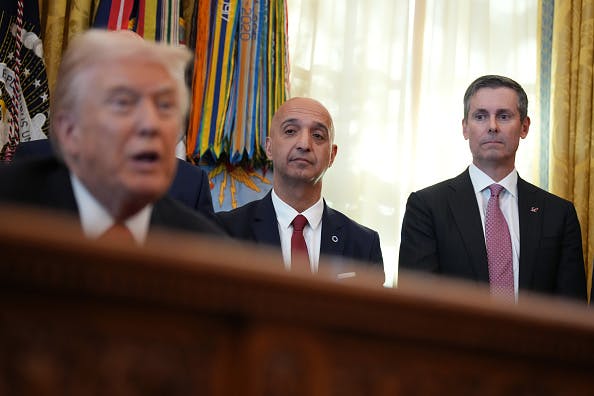White House unveils deal with Novo, Lilly on weight-loss drugs
The latest deal the administration has reached with Big Pharma is perhaps the one that would impact the highest number of Americans.
The White House announced that it has reached a deal with Novo Nordisk and Eli Lilly to lower the price of their some of their blockbuster GLP-1 drugs starting next year in exchange for Medicare and Medicaid covering the drugs for weight loss.
President Trump said on Thursday that the drugmakers have agreed to sell Lilly’s Zepbound and Novo’s Wegovy directly to consumers for $346 and $250 a month, respectively. Currently, those drugs cost between $300 and $500 a month out of pocket through the drugmakers’ direct-to-consumer platforms.
Oral options, which are still in development, will be available for $149 a month, Trump said in the Oval Office as Novo CEO Mike Doustdar and Lilly CEO David Ricks stood behind him.
“I call it the ‘fat drug,’” Trump said. “They make a lot of money, but they’re entitled to the money — they do very well.”
The event was halted briefly and press cleared from the room after a man standing behind the president fainted.
In a statement, Lilly clarified that its upcoming GLP-1 pill, orforglipron, will be available at $149 for the lowest starting dose, with additional doses up to $399. It also said its Zepbound shot would be priced at $299 for the lowest dose, with additional doses up to $449. In its own statement, Novo celebrated the agreement but said the details were not yet finalized.
The deal would also result in Medicare and Medicaid covering the drugs for weight loss, which would be a boon for the companies. Generally, their drugs are covered by government-sponsored plans only when prescribed for diabetes.
Trump alluded to the deal last month, telling reporters that “the fat loss drug” would go down in price. It’s the latest deal the administration has reached with Big Pharma, but perhaps one that would impact the highest number of Americans.
Hims & Hers, which sells cheaper copies of Novo’s drugs for about $200 a month, fell on the news.
When Pfizer confirmed a similar deal with Trump in September, the administration also announced “TrumpRx,” which is not yet functioning, but has been billed as a website that will point people to direct-to-consumer options from manufacturers — allowing Trump to put his stamp on a trend well underway in the industry.
Novo and Lilly already offer cash-pay options for their popular weight-loss shots, which are often not covered by insurance. By jumping over middlemen like insurance companies and pharmacies, the drugmakers are able to sell the popular shots directly to patients for less than half the list price.
Both companies have said that their expanded direct-to-consumer channels — which now include distribution deals with Walmart and Costco — have resulted in increased volume.
In its statement, Novo said it expects the deal to result in a “direct, negative low single-digit impact on global sales growth in 2026.” Lilly noted in its statement that the scope of the agreement “does not include pricing obligations in the commercial channel.”
